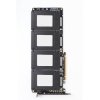I ordered some generic single AIC to rule out everything (checked all the slots and all my nvme drives around). The Kingston drives are solid, and only the Kioxia CD6-R drives have any issue (still looking for a FW update). The drives can be formatted and store data without an issue but they throw so many pages errors, as you can see by the time stamps (c1 way less than 46):
21:56:43 kernel: {51610}[Hardware Error]: bridge: secondary_status: 0x0000, control: 0x0000
21:56:38 kernel: nvme 0000:c1:00.0: AER: aer_layer=Physical Layer, aer_agent=Receiver ID
21:56:38 kernel: {51609}[Hardware Error]: bridge: secondary_status: 0x0000, control: 0x0000
21:56:33 kernel: nvme 0000:46:00.0: AER: aer_layer=Physical Layer, aer_agent=Receiver ID
21:56:33 kernel: {51608}[Hardware Error]: bridge: secondary_status: 0x0000, control: 0x0000
21:56:27 kernel: nvme 0000:46:00.0: AER: aer_layer=Physical Layer, aer_agent=Receiver ID
21:56:27 kernel: {51607}[Hardware Error]: bridge: secondary_status: 0x0000, control: 0x0000
21:56:22 kernel: nvme 0000:46:00.0: AER: aer_layer=Physical Layer, aer_agent=Receiver ID
21:56:22 kernel: {51606}[Hardware Error]: bridge: secondary_status: 0x0000, control: 0x0000
21:56:16 kernel: nvme 0000:46:00.0: AER: aer_layer=Physical Layer, aer_agent=Receiver ID
21:56:16 kernel: {51605}[Hardware Error]: bridge: secondary_status: 0x0000, control: 0x0000
21:56:11 kernel: nvme 0000:46:00.0: AER: aer_layer=Physical Layer, aer_agent=Receiver ID
21:56:11 kernel: {51604}[Hardware Error]: bridge: secondary_status: 0x0000, control: 0x0000
21:56:05 kernel: nvme 0000:46:00.0: AER: aer_layer=Physical Layer, aer_agent=Receiver ID
21:56:05 kernel: {51603}[Hardware Error]: bridge: secondary_status: 0x0000, control: 0x0000
21:56:00 kernel: nvme 0000:46:00.0: AER: aer_layer=Physical Layer, aer_agent=Receiver ID
21:56:00 kernel: {51602}[Hardware Error]: bridge: secondary_status: 0x0000, control: 0x0000
21:55:54 kernel: nvme 0000:46:00.0: AER: aer_layer=Physical Layer, aer_agent=Receiver ID
21:55:54 kernel: {51601}[Hardware Error]: bridge: secondary_status: 0x0000, control: 0x0000
21:55:49 kernel: nvme 0000:46:00.0: AER: aer_layer=Physical Layer, aer_agent=Receiver ID
21:55:49 kernel: {51600}[Hardware Error]: bridge: secondary_status: 0x0000, control: 0x0000
21:55:43 kernel: nvme 0000:46:00.0: AER: aer_layer=Physical Layer, aer_agent=Receiver ID
21:55:43 kernel: {51599}[Hardware Error]: bridge: secondary_status: 0x0000, control: 0x0000
21:55:38 kernel: nvme 0000:46:00.0: AER: aer_layer=Physical Layer, aer_agent=Receiver ID
21:55:38 kernel: {51598}[Hardware Error]: bridge: secondary_status: 0x0000, control: 0x0000
21:55:32 kernel: nvme 0000:46:00.0: AER: aer_layer=Physical Layer, aer_agent=Receiver ID
21:55:32 kernel: {51597}[Hardware Error]: bridge: secondary_status: 0x0000, control: 0x0000
21:55:27 kernel: nvme 0000:46:00.0: AER: aer_layer=Physical Layer, aer_agent=Receiver ID
21:55:27 kernel: {51596}[Hardware Error]: bridge: secondary_status: 0x0000, control: 0x0000
21:55:21 kernel: nvme 0000:46:00.0: AER: aer_layer=Physical Layer, aer_agent=Receiver ID
21:55:21 kernel: {51595}[Hardware Error]: bridge: secondary_status: 0x0000, control: 0x0000
21:55:16 kernel: nvme 0000:46:00.0: AER: aer_layer=Physical Layer, aer_agent=Receiver ID
21:55:16 kernel: {51594}[Hardware Error]: bridge: secondary_status: 0x0000, control: 0x0000
21:55:10 kernel: nvme 0000:46:00.0: AER: aer_layer=Physical Layer, aer_agent=Receiver ID
21:55:10 kernel: {51593}[Hardware Error]: bridge: secondary_status: 0x0000, control: 0x0000
21:55:05 kernel: nvme 0000:46:00.0: AER: aer_layer=Physical Layer, aer_agent=Receiver ID
21:55:05 kernel: {51592}[Hardware Error]: bridge: secondary_status: 0x0000, control: 0x0000
21:54:59 kernel: nvme 0000:46:00.0: AER: aer_layer=Physical Layer, aer_agent=Receiver ID
21:54:54 kernel: {51591}[Hardware Error]: bridge: secondary_status: 0x0000, control: 0x0000
21:54:48 kernel: nvme 0000:c1:00.0: AER: aer_layer=Physical Layer, aer_agent=Receiver ID
21:54:48 kernel: {51590}[Hardware Error]: bridge: secondary_status: 0x0000, control: 0x0000
21:54:43 kernel: nvme 0000:46:00.0: AER: aer_layer=Physical Layer, aer_agent=Receiver ID
21:54:43 kernel: {51589}[Hardware Error]: bridge: secondary_status: 0x0000, control: 0x0000
21:54:37 kernel: nvme 0000:46:00.0: AER: aer_layer=Physical Layer, aer_agent=Receiver ID
21:54:37 kernel: {51588}[Hardware Error]: bridge: secondary_status: 0x0000, control: 0x0000
21:54:32 kernel: nvme 0000:46:00.0: AER: aer_layer=Physical Layer, aer_agent=Receiver ID
21:54:32 kernel: {51587}[Hardware Error]: bridge: secondary_status: 0x0000, control: 0x0000
21:54:26 kernel: nvme 0000:46:00.0: AER: aer_layer=Physical Layer, aer_agent=Receiver ID
21:54:26 kernel: {51586}[Hardware Error]: bridge: secondary_status: 0x0000, control: 0x0000
21:54:21 kernel: nvme 0000:46:00.0: AER: aer_layer=Physical Layer, aer_agent=Receiver ID
21:54:21 kernel: {51585}[Hardware Error]: bridge: secondary_status: 0x0000, control: 0x0000
21:54:15 kernel: nvme 0000:46:00.0: AER: aer_layer=Physical Layer, aer_agent=Receiver ID
21:54:15 kernel: {51584}[Hardware Error]: bridge: secondary_status: 0x0000, control: 0x0000
21:54:10 kernel: nvme 0000:46:00.0: AER: aer_layer=Physical Layer, aer_agent=Receiver ID
21:54:10 kernel: {51583}[Hardware Error]: bridge: secondary_status: 0x0000, control: 0x0000
21:54:04 kernel: nvme 0000:46:00.0: AER: aer_layer=Physical Layer, aer_agent=Receiver ID
21:54:04 kernel: {51582}[Hardware Error]: bridge: secondary_status: 0x0000, control: 0x0000
21:53:59 kernel: nvme 0000:46:00.0: AER: aer_layer=Physical Layer, aer_agent=Receiver ID
21:53:59 kernel: {51581}[Hardware Error]: bridge: secondary_status: 0x0000, control: 0x0000
21:53:53 kernel: nvme 0000:46:00.0: AER: aer_layer=Physical Layer, aer_agent=Receiver ID
21:53:53 kernel: {51580}[Hardware Error]: bridge: secondary_status: 0x0000, control: 0x0000
21:53:48 kernel: nvme 0000:46:00.0: AER: aer_layer=Physical Layer, aer_agent=Receiver ID
21:53:48 kernel: {51579}[Hardware Error]: bridge: secondary_status: 0x0000, control: 0x0000
21:53:42 kernel: nvme 0000:46:00.0: AER: aer_layer=Physical Layer, aer_agent=Receiver ID
21:53:42 kernel: {51578}[Hardware Error]: bridge: secondary_status: 0x0000, control: 0x0000
21:53:37 kernel: nvme 0000:46:00.0: AER: aer_layer=Physical Layer, aer_agent=Receiver ID
 evice:Function: 0x80:0x1:0x2
evice:Function: 0x80:0x1:0x2 evice:Function: 0x82:0x0:0x0
evice:Function: 0x82:0x0:0x0 CI\VEN_1022&DEV_1483&SUBSYS_14531022&REV_00
CI\VEN_1022&DEV_1483&SUBSYS_14531022&REV_00 CI\VEN_1E0F&DEV_0007&SUBSYS_00211E0F&REV_01
CI\VEN_1E0F&DEV_0007&SUBSYS_00211E0F&REV_01